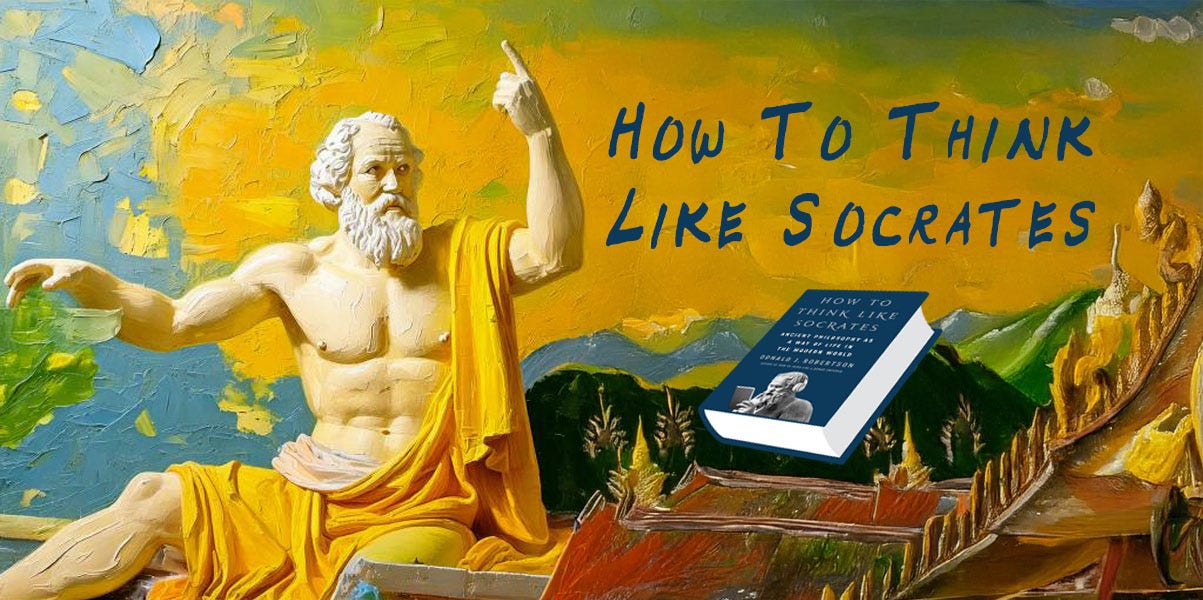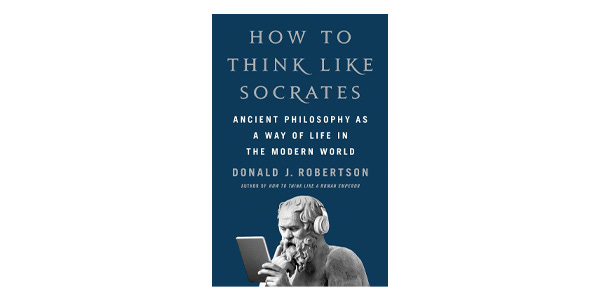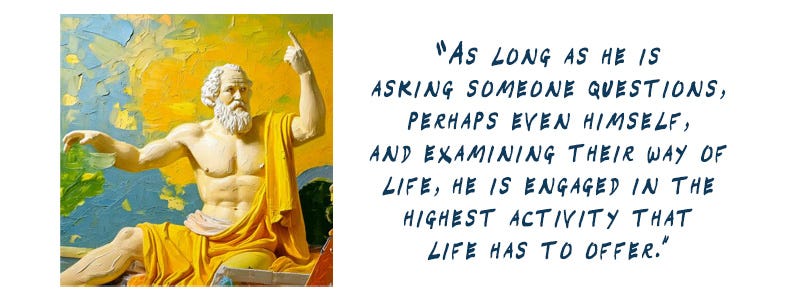Donald Robertson’s new book How To Think Like Socrates will be a welcome release for anyone keen to delve into the life of the man often referred to as the grandfather of Western philosophy.
Almost all philosophical schools after Socrates traced their roots to him, including the Stoics.
Within the work, we get biographical detail, insights into Socrates’ character, and ultimately, an understanding of why he’s still such a revered figure.
From the book’s description:
How to Think Like Socrates is an entertaining and informative primer on the life of the great thinker – and the first book to focus on applying his ideas to our daily lives. Author Donald Robertson transports readers back to the streets of ancient Athens, expertly weaving together a page-turning account of the visionary man who eschewed material pleasures and stood by his beliefs, even in the face of controversy, with a steadfastness that ultimately resulted in his execution.
How to Think Like Socrates takes a similar format to Donald’s hugely popular How to Think Like a Roman Emperor, weaving in practical techniques derived from the Socratic method and Cognitive Behavioural Therapy that can help with things like depression, anxiety, and anger.
So not only does the reader become aware of how they might think like Socrates, they also find evidence for why that might be a good idea.
Below is a short summary/review of How to Think Like Socrates with some useful takeaways, but of course to get the full experience, I recommend grabbing a copy for yourself.
You can also check out my conversation about the book with
here:If you’d like to go further with your Stoic practice, you can upgrade to a paid subscription and receive my Monday-Friday Micro Morning Meditations.
These 3-part Stoic morning routines can be completed in under 10 minutes and will ensure you are ready for the day ahead. You’ll also have full access to 500+ past editions.
How To Think Like Socrates
Why would anyone want to think like Socrates?
Haven’t our mental models moved on from 400 BC?
Isn’t human nature unrecognisable now?
Aren’t things just wildly different, too different for someone like Socrates to still be of value?
Well, maybe not as different as we might think.
In How to Think Like Socrates, Donald Robertson talks of a healthy form of nostalgia that encourages people to follow the examples of the likes of Plato and Socrates, and the powerful feeling that came to the author when he laid his hand on the grass near the site of Plato’s Academy.
It’s this nostalgia, this healthy nostalgia, that can feel so enlivening to those of us with an interest in history and philosophy.
It’s not just that we can learn about ancient figures. As this book proves, we’ll forever be able to learn from them.
We might assume that such nostalgic experiences are in danger of becoming obsolete as technology advances and our access to information edges toward instantaneous. Some might see Socrates as irrelevant in an age when one can ask AI anything.
There’s something Socrates’ philosophy gave his followers that AI can’t, however: The ability to hold conversations with oneself. And this ability is something that is just as beneficial now as it was back then.
Donald Robertson explains why:
Wisdom cannot be purchased, at any price, from the labor of other people. It can only come from our own efforts.
And as Socrates says in the book:
For a true philosopher, who loves wisdom more than anything, requires nothing besides the ability to reason in order to be happy. As long as he is asking someone questions, perhaps even himself, and examining their way of life, he is engaged in the highest activity that life has to offer.
It’s been a challenge for people in the past, just as it is for us today. We want to improve. We gather as much information as we can, and we think that the gathering of the information itself is the self-improvement.
What we learn from Socrates is that it actually has more to do with the conversations we have with ourselves than the Wisdom we’re trying to absorb from all the different sources at our disposal.
In a swipe at Sophistry, Socrates says that rhetoric is to the mind as confectionery is to the body—both are knacks that their practitioners have developed for pandering to the desires of the ignorant, and neither pays any attention to what is in anyone’s best interests.
Again, we see that human nature hasn’t changed as much as we might think.
Then, as now, people would get led down unhelpful paths despite having an honest desire to improve. Just like the ancient Sophists (paid teachers whose motives were often questioned), many modern “self-help influencers” sound good in what they’re offering, but ultimately want something from us as opposed to being truly focused on helping us improve.
We still need to figure out for ourselves who to pay attention to.
The major difference between Socratic self-improvement and modern self-improvement is that the former helps us ask better questions, while the latter usually claims to provide us with all the answers.
This aligns with one of my favourite explanations of Stoicism, from Kai Whiting’s book, Being Better:
Stoicism won’t remove all of life’s obstacles, but it helps us to think differently about them. It won’t provide us with all the answers, but it gives us the ability to form the questions that ultimately lead to the solutions.
Socrates, as Plutarch puts it, was the first to show that philosophy is applicable to our lives at all times and in all aspects, and to every one of our experiences and activities. It’s in the act of asking questions that philosophy becomes so transcendent.
As Donald Robertson says, questions such as “What is best in life?” are far too important to be trusted to other people. We each have a duty to answer it for ourselves, by using our own reason.
In How To Think Like Socrates, we learn how to ask and answer such questions.
We’re reminded that philosophy is an activity of reason rather than merely a set of doctrines that can be committed to memory.
A striking point raised in the book is that we no longer have a satisfactory word in English to describe eudaimonia, whereas the ancient Greek philosophers took it to be the most important thing in life.
We think of it now as well-being, happiness, or even flourishing. But none of these quite seem to capture it.
Maybe that’s a sign, says Robertson, that over the intervening centuries we’ve grown more complacent, more dependent on the opinions of others, and neglect to reason for ourselves about the fundamental goal of life.
Could thinking like Socrates be the answer that furnishes us with the questions we need to ask?









